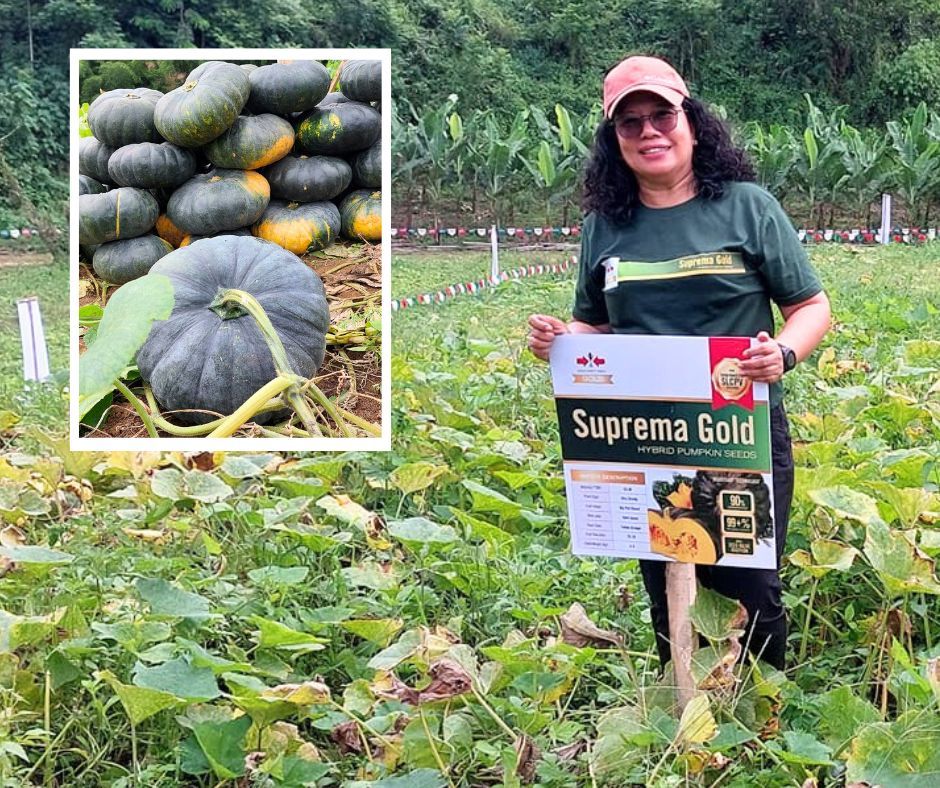
For Renita Ulep-Beronilla, the humble kalabasa, or squash, is not just an ordinary vegetable seen in popular Filipino dishes like pinakbet. It is also one of the easiest vegetables to grow. And for decades, farmers have found it a source of steady income.
Not until a deadly virus known as “kulot” came. Kulot is what local farmers call the Squash Leaf Curl Philippine virus that causes squash leaves to curl and therefore stop functioning, killing the plant in the process.
As head of plant breeding at East-West Seeds Philippines, Renita has worked for the past 12 years finding a cure for this disease. And finally, she and her team has developed a kalabasa variety that can resist the virus.
The release of the kulot-resistant squash variety Suprema Gold last month marks a significant milestone in Renita’s career and for the squash farming industry in the Philippines.
Renita said the kulot virus is transmitted by whiteflies and causes widespread damage to squash crops, resulting in stunted growth, deformed fruits, and significantly lower yields. Farmers accustomed to easy cultivation suddenly faced near-total losses, as fields once filled with thriving squash plants were overrun with sickly, yellowed vines.
“Kulot took many farmers by surprise,” Renita explains. “They hadn’t dealt with a virus like this before, and it spread quickly. Many were forced to abandon squash farming altogether because they couldn’t control the whiteflies or the damage caused by the virus.”
The impact of kulot was profound, particularly on smallholder farmers, who were hardest hit by the losses. Many lacked the resources to implement effective pest management strategies, leading to declining harvests and profits.
After years of research, trials, and plant breeding efforts, Renita and her team finally succeeded with the release of Suprema Gold, a hybrid variety specifically designed to withstand kulot. Released just last month, Suprema Gold is already being hailed as a game-changer for squash farmers across the country.
“We knew the urgency of finding a solution to kulot,” Renita says. “With Suprema Gold, we’re giving farmers a chance to return to growing squash without the constant fear of losing their entire crop to the virus.”
According to Renita, the new variety her team has developed is not only resistant to kulot but also boasts improved yields, better fruit quality, and adaptability to a range of growing conditions in the Philippines. Early feedback from farmers who have planted Suprema Gold in virus-prone areas has been overwhelmingly positive, with reports of healthier plants, larger harvests, and reduced need for pesticides.
“Farmers have told us that Suprema Gold is performing well even in areas where kulot used to decimate crops,” Renita shares proudly. “This variety gives them hope and, most importantly, a path back to profitability.”
Despite the challenges posed by kulot, the demand for squash in the Philippines remains strong. Squash is a staple ingredient in Filipino households, used in various dishes like bulanglang and pinakbet. Beyond the fresh produce market, squash is also a key ingredient in processed products, including noodles, flour, and baby food, making it an important crop for both local consumption and export.
In 2022, squash production in the Philippines reached over 360,000 metric tons, with a growing portion of this used in value-added products for the health-conscious consumer market. As consumer demand for nutritious, locally produced food continues to rise, the market potential for squash remains high. However, the kulot virus had threatened this supply, making Suprema Gold a crucial innovation to stabilize production.
Renita believes that with the release of Suprema Gold, farmers will not only be able to meet this demand but also potentially expand their production.
“We’re hoping that Suprema Gold will revitalize the squash industry,” she says. “We want to give farmers the tools they need to grow more squash, improve their incomes, and meet the needs of both local and international markets.”